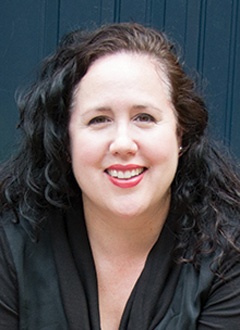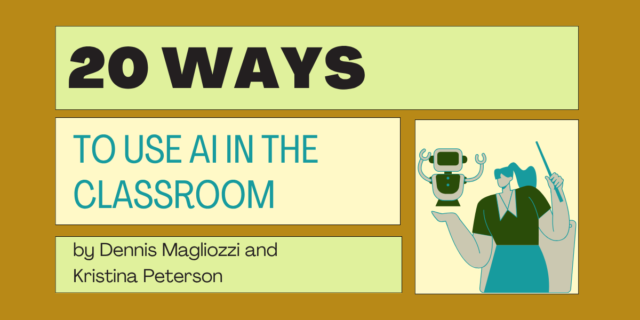
Veteran teacher and author Colleen Cruz has seen it all in the writing classroom—and she’s got something to admit: this is hard work. Real hard. In her new book The Unstoppable Writing Teacher she takes on the common concerns, struggles, and roadblocks that we all face in writing instruction and helps us engage in the process of problem solving each one. In today's post adapted from the book, Colleen presents a new kind of writing exercise for a different angle on mentor texts.
Get Back In Touch With Your Younger Self In Writing
One of the easiest ways to invite risk-taking and help support more lively and unique writing is to choose mentor texts that are not only good examples of the type of writing you are teaching, but also are beautiful, jarring, unusual, or inspiring. It’s tempting to stick to mentor texts that tell stories we’ve already heard, that share ideas we already agree with, that teach about topics that are very run-of-the-mill. They technically get the job done. Students see examples of how writing in this genre can go.
However, if you notice that your students’ writing falls in line with that same vanilla writing, you might want to kick things up a notch. One powerful option, albeit a personally risky one because it puts you, the teacher, more on stage, is to up the ante for your modeled writing. For a couple of years I used the same story about riding the Cyclone at Coney Island with my friend. It was a well-written story, but it was also sort of blah. And it led students to think that good writing didn’t require much heart. It was serendipitous for me to hear Donald Graves speak while I was wrestling with this issue. He espoused the importance of writing in front of and beside our students. He suggested that rather than trying to oversimplify and sanitize our adult lives, we should instead write about the time in our lives when we were the same age as our students. So, if we teach fifth-graders, we should endeavor to remember our fifth-grade selves and write about those stories, ideas, and interests. For example, in fifth-grade, my best friend and I got in trouble because instead of clapping the chalkboard erasers clean we pounded them on the asphalt. Our fifth-grade teacher made us use rags and water to clean up the mess. I was also passionately against littering and loved to learn as much as I could about hypnosis. All of these are great topics to bring into a classroom.
What if you can't really remember your eight-year-old self?
There are certainly a couple of tricky things for this. What if your writing is framed from an adult’s perspective? What if you can’t really remember your ten- year-old or eight- year-old self? What if your writing gets too interesting and the kids lose sight of the teaching? I recommend you make a mini-project and revive those memories, while reconnecting with your child-self and child perspective. A couple of things you might do to get back in touch with your younger self:
- Find pictures of yourself at that age. I get one look at that royal blue V-neck top and I am back in the 80s.
- Listen to music that was popular at the time. If I go anywhere a Diana Ross song is playing, I am suddenly a Girl Scout again.
- Eat candy and other food that was popular at the time. Nothing brings back memories to me quite like Big League Chew and Fun Dip.
- Follow your nose. Brain research tells us that one of the quickest paths to memory is to smell something connected to a time period. Folger’s coffee, bacon, orange blossoms, wet dog, will all take me back in time almost as effectively as a time machine.
- Sketch a map of your childhood haunts (childhood neighborhood, school, camp), annotating it with moments that stand out. I am surprised, no matter how many times I do this activity, how many new memories I uncover.
Consider current issues, passions, struggles, and remember a related experience or idea from childhood. Recently I was grappling with the idea that my parents were getting older and their mortality. And it started to make me think about possible losses in my life. Of course, that’s not a conversation I would get into with students. But I could think about losses when I was their age, like when my favorite teacher left on maternity leave, or my best friend told me she was transferring to a new school.
Once you have a few memories at your disposal you should be ready to go. Those memories will not only be good fodder for narratives, but will also likely remind you of some of your strong childhood opinions and interests. Students will understand that the things you are sharing are actually meaningful to you and uniquely your experiences. This will likely compel them to share their own more readily—which of course leads to better writing. Another plus of this strategy is that you can mine this material for years to come.
♦ ♦ ♦ ♦
 In addition to being the author of The Unstoppable Writing Teacher, M. Colleen Cruz is the author of several other titles for teachers, including Independent Writing and A Quick Guide to Helping Struggling Writers, as well as the author of the young adult novel Border Crossing, a Tomás Rivera Mexican American Children’s Book Award Finalist. Colleen was a classroom teacher in general education and inclusive settings before joining the Teachers College Reading and Writing Project where she is Senior Lead Staff Developer. Colleen presently supports schools, teachers and their students nationally and internationally as a literacy consultant.
In addition to being the author of The Unstoppable Writing Teacher, M. Colleen Cruz is the author of several other titles for teachers, including Independent Writing and A Quick Guide to Helping Struggling Writers, as well as the author of the young adult novel Border Crossing, a Tomás Rivera Mexican American Children’s Book Award Finalist. Colleen was a classroom teacher in general education and inclusive settings before joining the Teachers College Reading and Writing Project where she is Senior Lead Staff Developer. Colleen presently supports schools, teachers and their students nationally and internationally as a literacy consultant.


